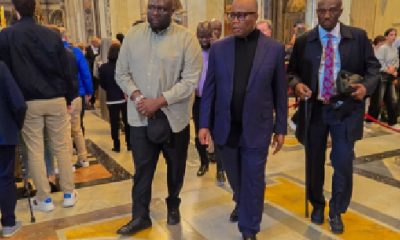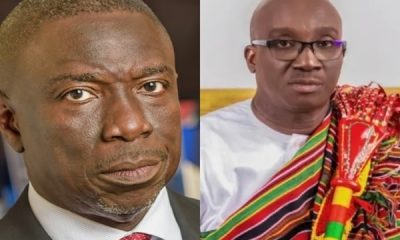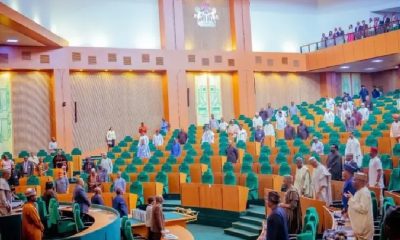Economy
Nigeria’s debt stock surges to N142trn on weak naira

Nigeria’s public debt profile has yet again increased by N8.02 trillion to N142 trillion as of the end of September 30, 2024 driven by the depreciation of the naira that has continued to affect the country’s cost of external obligation.
According to data published by the Debt Management Office (DMO) on Tuesday, the spike represented a 5.97 percent increase from N134.3 trillion recorded in the second quarter of 2024.
The debt, comprising external and domestic obligations, reflects the significant impact of exchange rate depreciation on external borrowings when converted to naira terms.
With the exchange rate weakening from N1,470.19/$ in June to N1,601.03/$ by the end of September, Africa’s fourth largest economy has as much as N68.88 trillion ($43 billion) as its foreign debt, accounting for 48.4 percent of the total debt stock.
In naira terms, external debt surged by 9.22 percent, rising from N63.07 trillion to N68.89 trillion within the quarter.
A more cursory look at the data showed that the Nigerian government relied more on domestic borrowings as it accounted for 51.6 percent of total debt profile, with the FGN taking N69.2 trillion and state governments having N4.2 trillion as their debt.
Domestic debt reduced by 5.34 percent in dollar terms, falling from $48.45 billion in June to $45.87 billlion in September. In naira terms, it rose by 3.10 percent from N71.22 trillion to N73.43 trillion during the period.
The Federal Government’s external debt accounted for $38.12 billion in September, up from $38.01 billlion in June, while states and the Federal Capital Territory held $4.91 billlion in external debt, a slight increase from $4.89 billion.
For domestic debt, the Federal Government’s obligations rose from N66.96 trillion to N69.22 trillion, while states and the FCT recorded a minor reduction from N4.27 trillion to N4.21 trillion.
Overall, Nigeria’s total public debt in dollar terms fell by 2.70 percent, from $91.35 billion in June to $88.89 billlion in September.
However, Nigeria’s debt stock has grown from 78.13 percent recorded in June 2024 to 78.95 percent in September 2024, defying the DMO’s self-imposed public debt ceiling of 40 percent, as outlined in the agency’s Medium-Term Debt Management Strategy.
Although the current public debt-to-GDP ratio of about 55 percent is slightly below the IMF’s 60 percent benchmark for emerging market countries, the nation’s weak revenue profile and FX volatility risks could further escalate debt levels, straining the already strained economy.
Rising public debt means elevated debt-to-service cost. The rising debt profile, particularly in naira terms, raises concerns over debt sustainability, especially with the exchange rate volatility driving up the local currency cost of external obligations.
Analysts have expressed concerns over the rising debt levels, warning that it could trigger a debt crisis for a country that’s reeling from its worst cost of living crisis in a generation.
While the exchange rate has begun to show reduced volatility due to the various central bank’s policies, analysts believe that the proposed tax reforms, if passed, might help Nigeria boost its revenue base and lower borrowings.
Credit: Businessday NG.
Economy
More Nigerians to experience poverty by 2027 – World Bank

The World Bank’s latest Africa’s Pulse report has projects a grim future for Nigeria, with poverty expected to rise by 3.6 percentage points by 2027.
Released during the IMF and World Bank Spring Meetings in Washington, DC, the report cites Nigeria’s reliance on oil, economic fragility, and governance challenges as key drivers.
It highlights the country’s structural economic weaknesses, dependence on oil revenues, and national fragility as key barriers to meaningful poverty reduction.
“Poverty in resource-rich, fragile countries, including large economies like Nigeria and the Democratic Republic of Congo, is projected to increase by 3.6 percentage points between 2022 and 2027,” the report stated.
Despite recent growth in Nigeria’s non-oil sector during the last quarter of 2024, the World Bank warns that this progress is unlikely to translate into widespread poverty alleviation due to ongoing fiscal and institutional challenges.
The report emphasizes that Sub-Saharan Africa remains the world’s poorest region, with an overwhelming 80% of the globe’s 695 million extreme poor residing there in 2024.
Within the region, half of the 560 million extremely poor people were located in just four countries, including Nigeria.
In stark contrast, South Asia accounted for 8% of the world’s extremely poor population, East Asia and the Pacific 2%, the Middle East and North Africa 5%, and Latin America and the Caribbean 3%.
The World Bank attributes the rising poverty in Nigeria and similar economies to weakening oil prices and fragile governance structures, noting: “This follows a well-established pattern whereby resource wealth combined with fragility or conflict is associated with the highest poverty rates, averaging 46% in 2024, which is 13 percentage points higher than in non-fragile, resource-rich countries.”
Meanwhile, non-resource-rich countries in Africa are experiencing stronger economic growth and faster poverty reduction, buoyed by high agricultural commodity prices and more resilient fiscal policies.
To reverse Nigeria’s downward poverty trend, the World Bank recommends reforms that prioritize inclusive economic growth and stronger public financial management.
It calls on the government to focus on “improving fiscal management and building a stronger fiscal contract with citizens to promote inclusive economic development and long-term poverty alleviation.”
Economy
SEE current exchange rate of the Dollar to Naira

What Is the Dollar to Naira Exchange Rate at the Black Market (Aboki FX)?
Here is the Dollar to Naira exchange rate at the parallel market, popularly known as the black market (Aboki fx), for Tuesday, April 23, 2025.
You can exchange your dollars for naira at the following rates:
Black Market Exchange Rate (Lagos – April 23, 2025):
According to sources at the Bureau De Change (BDC), the exchange rate at the Lagos parallel market saw traders buying at ₦1610 and selling at ₦1620 per US dollar.
It’s important to note that the Central Bank of Nigeria (CBN) does not recognize the black market. The CBN advises individuals seeking foreign exchange transactions to do so through their banks.
Dollar to Naira Exchange Rates
Market Type Buying Rate Selling Rate
Black Market ₦1610 ₦1620
CBN Official Rate ₦1591 (Low) ₦1606 (High)
Note: Forex rates vary across dealers and regions, and actual rates may differ from those listed.
Meanwhile, the Nigeria Customs Service (NCS) has announced the seizure of 298 smuggled items worth ₦7.6 billion between January and March 2025. The NCS also disclosed that it generated a total revenue of ₦1.75 trillion in the first quarter of the year.
Economy
Volvo announces termination of 800 U.S. workers, cites tariff, market decline

Volvo Group has announced plans to lay off up to 800 workers at three of its U.S. facilities over the next three months, citing ongoing market uncertainty and declining demand exacerbated by tariffs introduced under the administration of President Donald Trump.
The affected locations include the Mack Trucks plant in Macungie, Pennsylvania, as well as Volvo Group sites in Dublin, Virginia, and Hagerstown, Maryland.
In a statement on Friday, Volvo Group North America confirmed that between 550 and 800 employees would be impacted.
The company, a subsidiary of Sweden’s AB Volvo, employs nearly 20,000 people across North America.
The layoffs come amid wider turmoil in the automotive and manufacturing sectors, as shifting U.S. trade policy and a series of tariffs continue to drive up production costs. Economists have pointed to the uncertainty surrounding Trump’s trade strategy as a factor undermining both business and consumer confidence, with concerns mounting over a potential economic slowdown or recession.
According to Volvo, the company is grappling with a decline in heavy-duty truck orders, driven by instability in freight rates, anticipated regulatory changes, and the growing financial burden of tariffs. “We regret having to take this action, but we need to align production with reduced demand for our vehicles,” a company spokesperson stated in an email quoted by Reuters.
Volvo’s announcement marks another blow to an industry already navigating a complex web of supply chain challenges and fluctuating market conditions, with other manufacturers also warning of potential cost hikes and disruptions tied to global trade disputes.
-

 News7 hours ago
News7 hours agoAkpabio arrives Vatican ahead Pope’s funeral
-

 News23 hours ago
News23 hours ago2027: Pro-Fubara protesters want suspended Gov to run as Atiku’s VP(Video)
-

 News17 hours ago
News17 hours agoRivers State is yet to fully stabilise– Ibas
-

 News24 hours ago
News24 hours agoFlights resume as NiMET unions suspend strike
-

 News24 hours ago
News24 hours agoEdo poll: How APC allegedly offered witnesses N30m bribe
-

 News5 hours ago
News5 hours agoDefections: Teejay Yusuf traces genesis of PDP palaver, key issues affecting Nigeria’s largest opposition party
-

 News20 hours ago
News20 hours agoOsun PDP Reps Dismiss Defection Claims, Pledge Support for Adeleke
-

 News24 hours ago
News24 hours agoOver 26,000 Lagos students failed 2024 WASSCE despite govt paying over N1.5bn WAEC fees


















